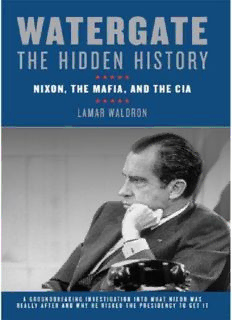
Watergate: The Hidden History : Nixon, the Mafia, and the CIA PDF
Preview Watergate: The Hidden History : Nixon, the Mafia, and the CIA
WATERGATE THE HIDDEN HISTORY WATERGATE THE HIDDEN HISTORY NIXON, THE MAFIA, AND THE CIA LAMAR WALDRON COUNTERPOINT BERKELEY Copyright © 2012 Lamar Waldron. All rights reserved under International and Pan-American Copyright Conventions. Library of Congress Cataloging-in-Publication Data is available ISBN: 978-1-61902-082-5 Cover Design by John Yates Counterpoint 1919 Fifth Street Berkeley, CA 94710 www.counterpointpress.com Distributed by Publishers Group West 10 9 8 7 6 5 4 3 2 1 This book is dedicated to the following authors, journalists, and investigators. In the 1970s, they uncovered crucial evidence about Watergate and related matters—and decades later, they’re still waiting for some of the most important files to be declassified. William Turner Anthony Summers Peter Dale Scott Dick Russell Peter Noyes Dan Moldea Gaeton Fonzi Contents PART I Chapter 1 Chapter 2 Richard Nixon Runs for Congress Chapter 3 Nixon: Congress, the Senate, and the Race for Vice President Chapter 4 Vice President Richard Nixon: The First Five Years Chapter 5 Nixon, the Mafia, and the CIA vs. Fidel Castro Chapter 6 Nixon, Hunt, and the CIA-Mafia Plots to Kill Fidel Chapter 7 August–October 1960: Nixon and the CIA-Mafia Plots to Kill Castro Chapter 8 September–November 1960: Nixon’s First Mafia Bribe for Hoffa, and the Election PART II Chapter 9 November 1960–Early April 1961: The CIA Hides Its Mafia Plots from JFK Chapter 10 April 1960: The Real Reasons “the Bay of Pigs Thing” Failed Chapter 11 Spring 1961–Fall 1962: Bay of Pigs Aftermath to the Cuban Missile Crisis Chapter 12 Late 1962: “You Won’t Have Nixon to Kick Around Anymore” Chapter 13 January–June 1963: Nixon, JFK, and Cuban Operations Chapter 14 Summer and Early Fall 1963: Nixon, Hunt, and JFK’s Cuban Coup Plan Chapter 15 September–November 1963: Nixon and JFK Go to Dallas Chapter 16 November 22, 1963: Dallas, Washington, New York, Tampa, New Orleans Chapter 17 Late November and Early December 1963: National Security Cover- Ups . Chapter 18 December 1963–Mid-1966: Nixon in New York, Helms Is Promoted, Hunt Prospers, Barker Is Fired PART III Chapter 19 1966: Nixon & Rebozo, Helms & Hunt Chapter 20 January–March 1967: Jack Anderson, Rosselli, and Helms Chapter 21 Spring–Fall 1967: Another Helms Cover-Up and Nixon Decides to Run Chapter 22 1968: Tragedy for America, Triumph for Nixon Chapter 23 1969, Nixon’s First Year in Office: Leaks, Electronic Surveillance, and “Dirty Tricks” Chapter 24 1970: Nixon’s Covert Actions Involving Vietnam, Cuba, and Chile Chapter 25 January–July 1971: The Road to Watergate Chapter 26 Summer and Fall 1971: Nixon, Hunt, Barker, and the First Burglary Chapter 27 Nixon, the Mafia, Hoffa, the CIA, and Castro in 1971: Echoes of September 1960 Chapter 28 The 1972 Campaign: Why Nixon Ordered the Watergate Break-Ins Chapter 29 Nixon, the CIA-Mafia Plots, and Break-Ins: From the Chilean Embassy to Watergate Chapter 30 Mid-May to Mid-June 1972: The First Three Watergate Burglary Attempts Chapter 31 June 16 to Late June 1972: Another Watergate Burglary, Nixon, and “the Bay of Pigs Thing” Chapter 32 Late June 1972 to December 1972: The Cover-Up Holds and Reelection Chapter 33 January to Early May 1973: Nixon’s Pinnacle and the Gathering Storm Chapter 34 May 1973 to August 1974: Nixon, Rosselli, and Resignation Epilogue Late 1974 to 1979: Nixon Golfs with Mobsters, Investigations Continue, and Rosselli Is Murdered Appendix Acknowledgments Notes PART I CHAPTER 1 “I ordered that they use any means necessary, including illegal means . . .” President Richard Nixon to Chief of Staff Alexander Haig, 5-23-73 Almost forty years after the Watergate arrests on June 17, 1972, three myths about it are still pervasive. First, that the scandal only concerned “a third-rate burglary” of the headquarters of the Democratic National Committee (DNC), at the Watergate complex in Washington, D.C. Second, that the “cover-up was worse than the crime.” And finally, that two reporters—Bob Woodward and Carl Bernstein of The Washington Post—“brought down” President Richard M. Nixon. Not one of these is true. The three myths of Watergate have been demonstrably false for decades. President Nixon had his spokesman minimize the scandal’s importance by calling it “a third-rate burglary,” and Nixon was initially successful: Watergate was not a factor in—or even widely reported during—the fall 1972 Presidential campaign between President Nixon and Democratic candidate George McGovern. Richard Nixon was reelected in a landslide. What’s wrong with the “third-rate burglary” claim? To begin with, even the singular term “burglary” is misleading, since Congressional and Justice Department investigations showed that four burglaries were actually attempted at the Watergate. Additionally, in the weeks before the final Watergate breakin, Nixon’s Watergate operatives committed several other burglaries. Their targets ranged from Democratic offices (including those of McGovern, Gary Hart, and Sargent Shriver) to journalists to the Chilean embassy in Washington. Was the “the cover-up” worse than “the crime?” No—that’s another completely inaccurate myth, since Nixon’s own words prove that there wasn’t just one “crime.” From February 1971 to July 1973, Nixon secretly recorded his conversations at the Oval Office, and his other offices away from the White House. Only a handful of his closest aides knew about the taping system, and Nixon never intended for the tapes to become public. On those tapes, many released only in recent years, Nixon discussed many dozens of serious felonies,
Description: